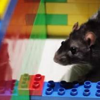

Scientist studying learning, memory, and decision-making. Poet and Playwright.
This profile is from a federated server and may be incomplete. Browse more on the original instance.

Scientist studying learning, memory, and decision-making. Poet and Playwright.
This profile is from a federated server and may be incomplete. Browse more on the original instance.